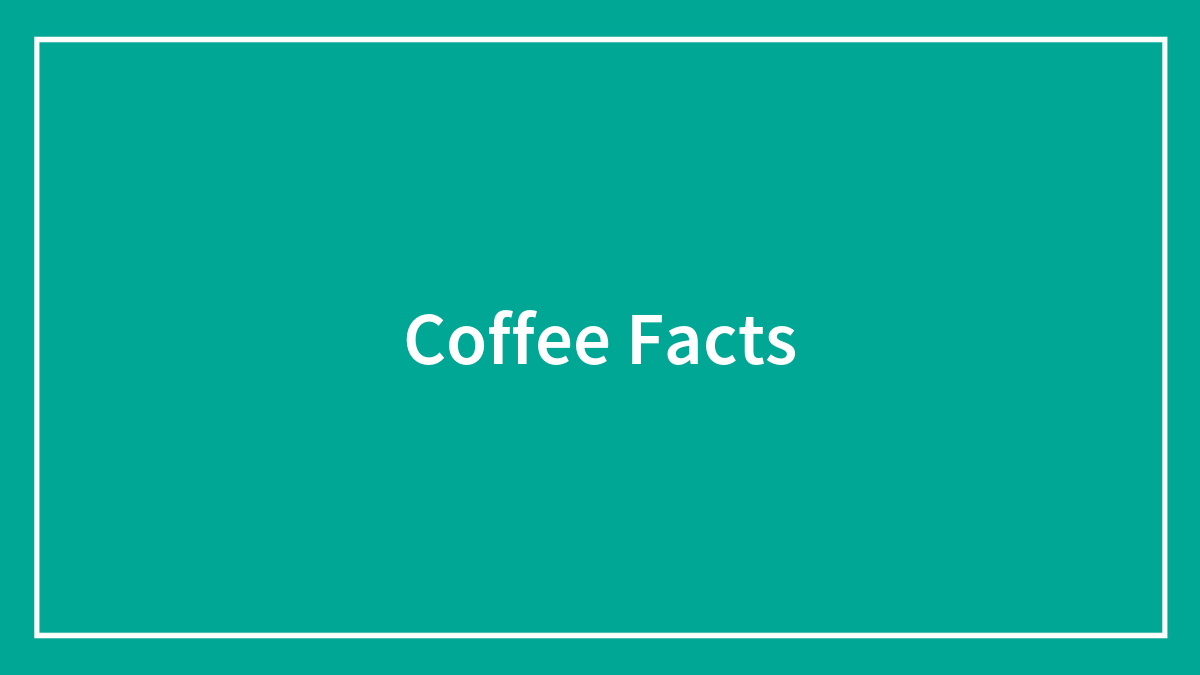Everyone who knows me at least a tiny bit knows that talking to me before I have had my first cup of morning coffee is a very bad idea. Lethal, even. And though this may sound strange or even unbelievable, there was a time in my life when coffee helped me rediscover my creativity and became my inspiration. That’s why it is quite understandable that I try to learn all about coffee at every opportunity.
Besides being a great source of energy, it has been scientifically proven that coffee also has a number of healthy properties. Of course, it should be consumed in moderation, but that applies even to the healthiest of foods. Many books have been written about coffee and ways to make it like a pro, so if you want to learn this subtle art without necessarily becoming a barista, you will find them very helpful.
If you are more into collecting facts about coffee, we’ve got you covered. For this article, we collected a pot of fun coffee info that you can share with your friends. You can even organize a game of coffee trivia because both the plant and the history of the drink are so full of fascinating and curious details, I can’t believe nobody has ever thought of dedicating a whole trivia game to it.
Enjoy these interesting facts about coffee below and don’t forget to let us know which ones you found most attention-worthy. And if you have a coffee fact you want to share with us, head over to the comment section! We will be waiting there with a hot cup.
This post may include affiliate links.
In 1932, coffee beans sent Brazilian athletes to the Olympics. Brazil couldn't afford to send competitors to the Los Angeles Olympics in 1932. As a result, they filled their ship with coffee and sold it as they traveled.
One day, coffee may be used to fuel your automobile as scientists are working to turn discarded coffee grounds' oil into biodiesel.
The capital of coffee in the world is Finland. Despite not having any domestic bean production, Finland's population consumes a lot of the dark liquid. The most of any nation in the world, the typical Finn consumes roughly 4 cups of coffee every day.
A number of attempts have been made to completely outlaw coffee. Governments were attempting to ban coffee as recently as the 18th century. The beverage was outlawed for a variety of reasons, one of which was its propensity to encourage "radical thinking." Sweden went too far in 1746 and outlawed both coffee and coffee accessories (i.e. cups and saucers).
Drinking coffee was once punishable by death. Coffee was thought to have hallucinogenic properties during the Ottoman Empire's 17th century. Because the monarch of this time period considered it to be a narcotic, he forbade its use in public.
The priciest coffee in the world is made from animal feces. One of the most expensive coffees in the world, Kopi Luwak, is made more expensive by an unexpected process of digestion. Even though they can't digest the actual coffee beans, the Asian palm civet, a small mammal related to the weasel, is unable to resist the brilliant red coffee cherries that are in plenty in Indonesia. Without being fully digested, the beans travel through the civets' systems. The beans are then extracted from the civets' excrement by a courageous coffee farmer, who then sells them for up to $600 a pound after giving them a thorough washing.
I sure hope the poor fools gathering the beans are the ones profiting from it, otherwise it sounds like a s****y job
People who consume coffee live longer than those who don't. According to Harvard Health Publishing, research has linked moderate intake (about 3–4 cups per day) to a longer life span, as well as a lower risk of cardiovascular disease, type 2 diabetes, and Parkinson's disease.
Coffee accelerates metabolism. Caffeine is a stimulant that is naturally found in coffee and briefly speeds up metabolism. To increase the likelihood of burning fat during exercise, some fitness instructors even suggest drinking coffee beforehand.
In German government buildings, coffee pods are banned. It was discovered that this rule produced unneeded waste that contained aluminum, leading to its establishment in 2016.
Yeah, coffee pods and the machines that use them should be banned. They create too much waste. If the idea was to make a single cup, with a reusable pod, that would be great. Now we have machines that won't brew unless you use thier specific branded pod...
The CIA's main office has a Starbucks. Although some CIA agents refer to it as "Stealthy Starbucks," the staff at the Langley, Virginia, branch is unquestionably unique from other Starbucks staff members. They have to go through comprehensive background investigations, and they are not allowed to leave their post without a CIA escort. Positive: They don't have to remember or yell out the names of their clients!
Having coffee reduces the chance of suicide. It has been shown that drinking two to four cups of coffee each day can cut the risk of suicide in half. Contrary to those who consume coffee, a greater proportion of non-coffee drinkers commit suicide.
Nearly 250 years have passed since the invention of instant coffee. Since its introduction in England in 1771, instant coffee has been around for a while. However, it would take a another 139 years for the first instant coffee to be mass-produced and released (and patented) in the United States in 1910.
Caffeine is completely removed from your system in roughly 10 hours. Within 5 hours, you can eliminate half of the caffeine you've consumed from your system. Caffeine's effects peak between 30 and 60 minutes after ingestion.
The Arabic term "qahwah," which describes a specific type of wine, is where the word "coffee" originates.
this is not correct at all, qahwah is coffee and it is always been the name of coffee, never been used for anything else anywhere. now is tart to doubt the information listed here
In America, cider or beer was the preferred breakfast beverage before coffee became well-liked, including among kids.
Originally, coffee was chewed. Your preferred method of drinking coffee may be sipping, but coffee hasn't always been a liquid treat. Many historians assert that the earliest African tribes to consume coffee ground the berries together, added some animal fat, and formed the caffeinated treats into tiny edible energy balls.
By consuming coffee, men can lower their risk of developing prostate cancer. According to studies, males who consume six or more cups of coffee each day can reduce their risks by 20%.
Women in the 17th century believed that coffee made their men "useless corpses." The Women's Petition Against Coffee suggested a ban on coffee for anybody under the age of 60 in 1674, alleging that the beverage was transforming British men into "useless corpses."
These were the same people who had beer for breakfast, because you can't drink the water without getting sick.
Coffee does not cause dehydration. Caffeine has a diuretic effect, which makes you feel more dehydrated after drinking it. Caffeine, which is present in beverages like coffee and tea, makes you urinate more frequently.
A tea importer popularized coffee in Britain. Even though tea and coffee are frequently portrayed as competing drinks, it was a tea importer who really brought the caffeinated beverage to Britain. Tea, salt, and silk were among the goods exported to Britain by the British East India Company, which conducted business with China and India. The business started importing coffee, and as a result of their efforts, the revitalizing beverage gained popularity in Britain.
By purchasing Fairtrade coffee, you help farmers improve the standard of living for their families, communities, and themselves as well as their ability to harvest higher-quality coffee beans. Even though this specific coffee is more expensive, coffee farmers devote an additional 25% of their effort to creating Fairtrade premium coffee. These goods have won over 28 accolades and are renowned for their higher-grade flavor.
Frankly, it's not a heck of a lot more expensive, AND Fair Trade has HUGE community benefits. If Starbucks, Dunkin' and McDonald's could add 1-2% more Fair Trade Coffee, the standard of living in places where coffee is grown would increase dramatically.
Coffee is available in two main types. Arabica and Robusta coffee are the 2 types. Somewhere in the Arabian peninsula was the first location where Arabica coffee was grown. Robusta coffee, on the other hand, comes from a tougher plant and has twice as much caffeine.
A 150-pound human may be killed in 70 cups of coffee. Anything in excess can be harmful, including your preferred individualized coffee drink. According to a video from AsapSCIENCE, a person weighing about 150 pounds would require 70 cups of coffee to kill them.
Norwegians drinks on an average 5 cups a day. Coffee drinkers in Norway typically have 5 cups per day. As a result, we contribute to keeping the daily global total of approximately 1.6 billion cups. Caffeine is now by far the most often utilized stimulant in the entire world due to this following intake.
One of the two states in America that grow coffee is Hawaii. High altitudes, tropical climates, and rich soil are all factors that affect good coffee-producing conditions. As a result, Hawaii is the only state where coffee plants can be grown, despite the rich and varied landscapes of the continental United States. Before it was a state, it started manufacturing coffee. Farms in California have recently begun to grow coffee bushes, though!
You should not drink coffee at night. Our brains may become delayed if we consume caffeine in the evening or at periods when we are resting. Our ability to produce melatonin is slowed by this. Additionally, it throws off our circadian rhythm by 40 minutes.
My neurodivergent brain has a paradoxical reaction to caffeine. It helps me sleep.
Coffee drinking can lower the risk of cirrhosis brought on by alcohol. Two cups of coffee a day can lower this risk by at least 43%, according to studies.
Coffee beans gain flavor and color during roasting. These coffee beans are roasted after being purchased as green beans. The browning of the coffee beans is a result of roasting. The way and duration of roasting determine the flavor and color of the coffee beans. As the beans roast, the sugar in them turns them brown. Darker beans are regarded as being more assertive, and lighter roasts as having stronger flavors.
Besides the more robust and deeper flavor, dark roast beans are also less acidic.
The Pope called coffee a Christian beverage. Many Christians were reluctant to consume coffee when it was initially widely introduced in Europe because they thought the dark elixir was a Muslim beverage. Coffee only gained significant traction in Europe after Pope Clement VIII proclaimed it a Christian beverage in 1600.
Adding cream keeps your coffee warm. Coffee with cream stays warm 20% longer. A physicist is the one to ask about that. We believe it may be related to the idea that hot water is better for generating ice cubes than cold water when you need to quickly chill a fresh beverage.
The health effects of coffee on people were studied by Swedish King Gustav III. This experiment was carried out on identical twins who had been given the death penalty, per the king's order. On the condition that one twin consumes only coffee and the other only tea for the remainder of their lives, their sentence was commuted to life in jail. Two doctors were instructed to perform tests and give the king the direct results. These doctors, however, mysteriously passed away, most likely from natural causes. The King too went away before he could finish his studies.
I think this is one of the worst stories I have ever read. Here's the characters; here's the plot; they all just died. Well, thank-you very much. 'Here's Dave and Peter, they both are twins. They built a space rocket out of old baked bean tins. To fly to the stars, was their desire, but then they died. Of natural causes.' At least mine rhymed a bit.
The name 'Cappuccino' was inspired by monks. This term was given after the garb worn by Capuchin monks. Their robes' color and the color of espresso blended with frother milk were strikingly comparable. These monks belonged to the bigger Franciscan orders that were prevalent in Italy in the sixteenth century.
At one point Starbucks opened a new coffee store every 15 hours in China.
The coffee mugs in your office aren't as clean as you think. Office coffee mugs have fecal germs in them in about 20% of cases. This is made feasible in large part by the shared cleaning supplies, including brushes or scrubbing tools, located in the break room area.
The Bulletproof Coffee Diet primarily consists of fat and coffee. The Bulletproof Coffee Diet is the brainchild of Dave Asprey. Based on a Tibetan yak butter tea, this coffee diet. Bulletproof coffee can have about 450 calories per cup when made with brewed low-mold coffee beans, one to two tablespoons of medium-chain triglyceride oil, and two tablespoons of unsalted butter. Asprey thinks that coffee can help people feel full longer and think more clearly. His statements have not been supported by any studies.
Espresso is an Italian term that means "expressed" or "forced out." Espresso is created by applying intense pressure and extremely hot water to compressed, finely ground coffee.
Biggest cup of coffee. The biggest cup of coffee was made on June 15, 2019, at the Parque de Bolivar in Chinchiná, Caldas, Colombia, and measures 22,739.14 liters (5,001.91 UK gal; 6,007.04 US gal).
The very first webcam created was for watching a coffee maker work. The Cambridge researchers were able to keep an eye on the coffee issue in the Trojan Room without ever leaving their desks, despite the fact that it was hardly "action-packed." The Trojan Room coffee pot experiment's non-working Krups ProAroma pot, which usually sells for around $50, was put up for auction on eBay after the webcam component was abandoned, and was eventually sold for just under $5000.
Coffee beans are actually seeds in theory. Since of their resemblance to legumes, we call them "beans," even though they are actually the pits of the cherry-like berries that grow on flowering shrubs. Because of this, coffee beans are actually seeds.
The world's largest producer of coffee is Brazil. Brazil now produces nearly a third of the world's coffee supply, or about twice as much as Vietnam, who comes in second place.
Mecca banned coffee. Only a few years after its introduction in Ethiopia, in 1511, coffee was banned in Mecca. It was said to encourage innovative thinking and indolence.
yeah, gawd forbid people should actually use their brains for critical thinking. can't have that, now can we?
A coffee bean requires roughly 37 liters of water to grow. To make one 12 oz. cup of coffee, more than 1,300 gallons of water are required.
Coffee was introduced to Columbia by the Columbian exchange. After the Columbian exchange, coffee was introduced to and spread throughout the rest of the world from Ethiopia.
Second in the world. It is the second-most traded commodity in the world. The first is crude oil. No, there was no typo. Coffee is the second most popular beverage after water in terms of consumption. It is worth more than $100 billion globally.
There are absolutely no nuts in Chock Full o'Nuts coffee. The company is named after a network of nut stores that the founder converted into coffee cafés. However, the name stuck (no matter how confusing it may have been.)
There are several drink combinations at Starbucks. There are more than 87,000 different drink combinations in total.
Millions of people rely on coffee as their primary source of income. Coffee is the primary source of income for around 125 million small producers worldwide.
Espresso has more caffeine in it than regular coffee. However, because of the typical serving size, there is less caffeine present than in a mug of crewed coffee.
Drinking decaf coffee fuels the soda industry. Following the decaffeination of coffee beans, several coffee producers sell the caffeine to beverage and pharmaceutical firms.
When under stress, you should abstain from coffee. High amounts of caffeine can lead to negative health effects associated with prolonged elevated levels of cortisol.

 Dark Mode
Dark Mode 

 No fees, cancel anytime
No fees, cancel anytime 


























































